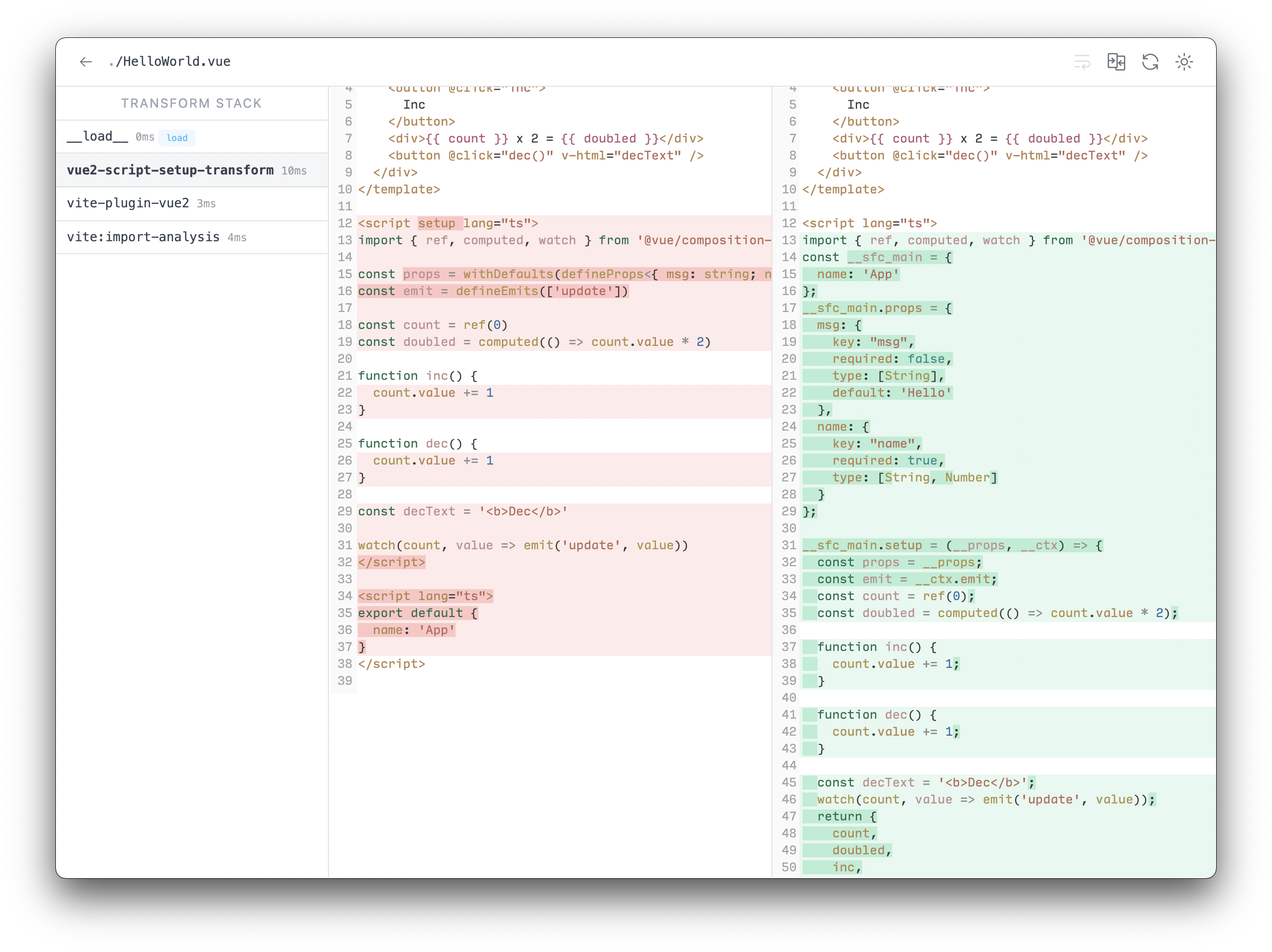Bring <script setup> to Vue 2. Works for Vite, Nuxt, Vue CLI, Webpack, esbuild and more, powered by unplugin.
npm i -D unplugin-vue2-script-setup
npm i @vue/composition-apiInstall @vue/composition-api in your App's entry (it enables the setup() hook):
import Vue from 'vue'
import VueCompositionAPI from '@vue/composition-api'
Vue.use(VueCompositionAPI)Vite
// vite.config.ts
import { defineConfig } from 'vite'
import { createVuePlugin as Vue2 } from 'vite-plugin-vue2'
import ScriptSetup from 'unplugin-vue2-script-setup/vite'
export default defineConfig({
plugins: [
Vue2(),
ScriptSetup({ /* options */ }),
],
})Example: playground/
Nuxt
From v0.28.0 of
@nuxtjs/composition-api, this plugin is included and enabled out-of-box.
npm i @nuxtjs/composition-api// nuxt.config.js
export default {
buildModules: [
'@nuxtjs/composition-api/module',
],
scriptSetup: { /* options */ },
}This module works for both Nuxt 2 and Nuxt Vite
Example: examples/nuxt
Note that <script setup> could co-exist with <script>, if you want to define component metadata like layout or head for Nuxt, you can do it this way:
<script setup lang="ts">
// your script setup
</script>
<script lang="ts">
// the normal script
export default {
layout: 'user',
// ...other meta
}
</script>To use TypeScript with Nuxt, install the @nuxtjs/typescript-module but disable the type check:
npm i -D @nuxt/typescript-build vue-tsc// nuxt.config.js
export default {
buildModules: [
['@nuxt/typescript-build', { typeCheck: false }],
'@nuxtjs/composition-api/module',
'unplugin-vue2-script-setup/nuxt',
],
}And then use vue-tsc to do the type check at build time:
Vue CLI
// vue.config.js
const ScriptSetup = require('unplugin-vue2-script-setup/webpack').default
module.exports = {
parallel: false, // disable thread-loader, which is not compactible with this plugin
configureWebpack: {
plugins: [
ScriptSetup({ /* options */ }),
],
},
}Example: examples/vue-cli
To use TypeScript with Vue CLI, install @vue/cli-plugin-typescript but disable the type check:
npm i -D @vue/cli-plugin-typescript vue-tscconst ScriptSetup = require('unplugin-vue2-script-setup/webpack').default
module.exports = {
parallel: false,
configureWebpack: {
plugins: [
ScriptSetup({ /* options */ }),
],
},
chainWebpack(config) {
// disable type check and let `vue-tsc` handles it
config.plugins.delete('fork-ts-checker')
},
}And then use vue-tsc to do the type check at build time:
// package.json
{
"scripts": {
"dev": "vue-cli-service serve",
"build": "vue-tsc --noEmit && vue-cli-service build"
}
}Webpack
// webpack.config.js
const ScriptSetup = require('unplugin-vue2-script-setup/webpack').default
module.exports = {
/* ... */
plugins: [
ScriptSetup({ /* options */ }),
]
}Rollup
// rollup.config.js
import Vue from 'rollup-plugin-vue'
import ScriptSetup from 'unplugin-vue2-script-setup/rollup'
export default {
plugins: [
Vue(),
ScriptSetup({ /* options */ }),
]
}esbuild
// esbuild.config.js
import { build } from 'esbuild'
import ScriptSetup from 'unplugin-vue2-script-setup/esbuild'
build({
/* ... */
plugins: [
ScriptSetup({
/* options */
}),
],
})Jest
npm i -D vue-jest// jest.config.js
module.exports = {
transform: {
'.*\\.(vue)$': 'unplugin-vue2-script-setup/jest',
},
}JavaScript API
import { transform } from 'unplugin-vue2-script-setup'
const Vue2SFC = transform(`
<template>
<!-- ... -->
</template>
<script setup>
// ...
</script>
`)We recommend using VS Code with Volar to get the best experience (You might want to disable Vetur if you have it).
When using Volar, you need to install @vue/runtime-dom as devDependencies to make it work on Vue 2.
npm i -D @vue/runtime-domIf the global types are missing for your IDE, update your tsconfig.json with:
{
"compilerOptions": {
"types": [
"unplugin-vue2-script-setup/types"
]
}
}Volar preferentially supports Vue 3. Vue 3 and Vue 2 template has some different. You need to set the experimentalCompatMode option to support Vue 2 template.
{
"compilerOptions": {
...
},
"vueCompilerOptions": {
"experimentalCompatMode": 2
},
}If you are using ESLint, you might get @typescript-eslint/no-unused-vars warning with <script setup>. You can disable it and add noUnusedLocals: true in your tsconfig.json, Volar will infer the real missing locals correctly for you.
Ref Sugar (take 2)
In v0.5.x, we shipped the experimental Ref Sugar (take 2) implementation based on Vue 3's @vue/reactivity-transform package. Notice the syntax is not settled yet and might be changed in the future updates. Use at your own risk!
To enabled it, pass the option:
ScriptSetup({
reactivityTransform: true
})To get TypeScript support, update your tsconfig.json with:
{
"compilerOptions": {
"types": [
"unplugin-vue2-script-setup/types",
"unplugin-vue2-script-setup/ref-macros"
]
}
}If you enjoy using <script setup>, you might also want to try unplugin-auto-import to improve the DX even further.
- PoC
- Components registration
- Compile time macros
definePropsdefineEmitswithDefaultsdefineExpose - Global types
- Merge with normal scripts
- Ref Sugar (take 2)
-
<template lang="pug">support - Vite plugin
- Webpack plugin
- Nuxt module
-
Top-level await(not supported)
👀
It's made possible by transforming the <script setup> syntax back to normal <script> and let the Vue 2 SFC compiler handle the rest.
MIT License © 2021 Anthony Fu


